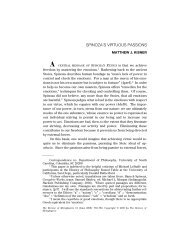heidegger's being and time and national socialism - Philosophy ...
heidegger's being and time and national socialism - Philosophy ...
heidegger's being and time and national socialism - Philosophy ...
Create successful ePaper yourself
Turn your PDF publications into a flip-book with our unique Google optimized e-Paper software.
those who are hired for the same affair often thrives<br />
only on mistrust. 45<br />
Here he uses the notion of “distance,” which he<br />
will explain in §27. This sentence corresponds to<br />
the part on the economy in §27, <strong>and</strong> deals either<br />
with the transition from a pre-capitalist mode of<br />
business to a capitalist business or only with the<br />
latter. As I pointed out in my book, the statement<br />
is in particular in <strong>time</strong>s of high unemployment a<br />
realistic account of the relations between the different<br />
individuals <strong>and</strong> groups in a capitalist company.<br />
46 In sum, “deficient mode” of solicitude is<br />
Heidegger’s name for liberalism <strong>and</strong> the modern,<br />
liberal life-world.<br />
Hegel uses the term “negative” (or “exclusive”)<br />
relation for the competitive relations in a<br />
liberal capitalist economy <strong>and</strong> for all those in<br />
which one treats the other as means. For all those<br />
in which the other is an end for oneself he uses the<br />
term “positive” relation. In guilds, unions, <strong>and</strong><br />
institutions of social welfare, in his terminology<br />
corporations, one relates to the other positively<br />
inasmuch as one makes the well<strong>being</strong> of the other<br />
<strong>and</strong> the whole corporation one’s own end. According<br />
to Hegel, the need for social welfare<br />
arises out of the shortcomings of the working of a<br />
liberal capitalist economy. 47 Heidegger takes<br />
over Hegel’s vocabulary <strong>and</strong> just replaces “negative”<br />
with “deficient” because, in this way, he can<br />
immediately indicate that, in his view, liberalism<br />
is a downward plunge. Social welfare is a manifestation<br />
of the first positive mode of solicitude<br />
(“With regard to its positive modes, solicitude<br />
has . . .”). 48 Like Hegel <strong>and</strong> any social democrat,<br />
Heidegger assumes that a liberal economy creates<br />
the need for social welfare (“For example,<br />
‘welfare work,’as a factical social arrangement ...<br />
Its factical urgency gets its motivation in that<br />
Dasein maintains itself proximally <strong>and</strong> for the<br />
most part in the deficient modes of solicitude”). 49<br />
In contrast to Hegel <strong>and</strong> social democrats, however,<br />
Heidegger disapproves of social welfare<br />
(“It can . . . The other is thus thrown out of his<br />
own position ...tobecome one who is dominated<br />
<strong>and</strong> dependent, even if this domination is a tacit<br />
one <strong>and</strong> remains hidden from him . . . <strong>and</strong> takes<br />
away care”). 50 The second positive mode of solicitude<br />
is the opposite of the first, it is practiced by<br />
PHILOSOPHY TODAY<br />
260<br />
authentic Dasein (“determined by the manner in<br />
which their Dasein, each in its own way, has been<br />
taken hold of”), 51 frees the other for his care <strong>and</strong><br />
freedom (“frees the Other in his freedom for himself”)<br />
52 <strong>and</strong> is quite obviously the one through<br />
which one gets out of the downward plunge of<br />
liberalism <strong>and</strong> social democracy. Heidegger calls<br />
it <strong>being</strong> “authentically bound together [eigentliche<br />
Verbundenheit].” 53<br />
The deficient mode is deficient in relation to<br />
something else, to the fourth mode of solicitude,<br />
a “Being with [that] underst<strong>and</strong>s primordially” 54<br />
<strong>and</strong> in which the other is disclosed “in concernful<br />
solicitude.” 55 Heidegger uses in this context for<br />
the deficient mode the term “subject”; he evidently<br />
thinks of Husserl’s theory of the Ego <strong>and</strong><br />
Theodor Lipps’ theory of empathy, <strong>and</strong> probably<br />
also of other modern theories of the subject. 56<br />
Since the individuals in the deficient mode of solicitude<br />
cannot rely on the primordial underst<strong>and</strong>ing<br />
of the other in the fourth mode of solicitude,<br />
they develop the crutches of empathy to<br />
reach the other. 57 According to Heidegger, the<br />
primordial underst<strong>and</strong>ing of the other in the<br />
fourth mode of solicitude is primary, <strong>and</strong> only on<br />
its basis does empathy function. According to<br />
Heidegger, however, the philosophers promoting<br />
empathy <strong>and</strong> liberal individuals themselves pervert<br />
this order <strong>and</strong> even ignore the primordial underst<strong>and</strong>ing<br />
of the other in the fourth mode of solicitude.<br />
Rather, they claim that empathy is<br />
primary <strong>and</strong> makes possible the <strong>being</strong> to the other<br />
Dasein. They also assume that reflection on oneself<br />
is primary <strong>and</strong> grounds one’s relations to<br />
other Dasein. By contrast, Heidegger claims that<br />
the latter is primary <strong>and</strong> the former secondary, if<br />
not superfluous 58 —an instance of Heidegger’s<br />
usage of the first part of the structure of<br />
temporalized metaphysics, the motif of double<br />
forgetting. 59 A corresponding perversion—or the<br />
same perversion—Heidegger obviously finds in<br />
Kant’s ethics. According to the second formulation<br />
of the categorical imperative, one should act<br />
such that one treats humanity in one’s own person<br />
<strong>and</strong> in the person of any other “always at the<br />
same <strong>time</strong> as an end, never merely as a means.” 60<br />
By contrast, Heidegger states—without any argument<br />
<strong>and</strong> without any explanation of the pre-
















